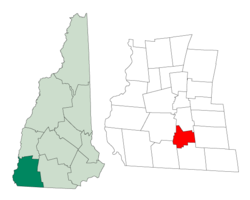Troy, New Hampshire
| Troy, New Hampshire | |
|---|---|
| Town | |

Town Hall
|
|
 Location in Cheshire County, New Hampshire |
|
| Coordinates: 42°49′30″N 72°11′01″W / 42.82500°N 72.18361°WCoordinates: 42°49′30″N 72°11′01″W / 42.82500°N 72.18361°W | |
| Country | United States |
| State | New Hampshire |
| County | Cheshire |
| Incorporated | 1815 |
| Government | |
| • Board of Selectmen | Allan Bailey, Chair Curtis Hopkins Barbara Guelcher |
| Area | |
| • Total | 17.6 sq mi (45.5 km2) |
| • Land | 17.4 sq mi (45.1 km2) |
| • Water | 0.2 sq mi (0.4 km2) 0.89% |
| Elevation | 1,010 ft (308 m) |
| Population (2010) | |
| • Total | 2,145 |
| • Density | 123/sq mi (47.5/km2) |
| Time zone | Eastern (UTC-5) |
| • Summer (DST) | Eastern (UTC-4) |
| ZIP code | 03465 |
| Area code(s) | 603 |
| FIPS code | 33-77380 |
| GNIS feature ID | 0873740 |
| Website | www |
Troy is a town in Cheshire County, New Hampshire, United States. The population was 2,145 at the 2010 census. It is situated at the base of Mount Monadnock.
The town center village, where 1,221 people resided at the 2010 census, is defined as the Troy census-designated place (CDP), and is located along New Hampshire Route 12. It is listed on the National Register of Historic Places as Troy Village Historic District.
Settled in 1762, by 1815 the community had grown so much that it sought its own incorporation. It was set off from Marlborough that year, and included parts of Fitzwilliam, Swanzey and Richmond. A prominent citizen and friend of Governor John Taylor Gilman, Captain Benjamin Mann of Mason, suggested the name Troy. His daughter, Betsy, was married to Samuel Wilson, famous as "Uncle Sam", and at that time a resident of Troy, New York. At least seven members of Wilson's family were living in the town at the time, thus securing the name. The town hall, built in 1813-1814 near the rail-fenced common, was originally the village meetinghouse.
Troy Mills, which started making horse blankets in the mid-19th century, served as the backbone of the town's economy for nearly 100 years. In 1865, the company was sold by founder Thomas Goodall, who in 1867 would establish Goodall Mills in Sanford, Maine. Troy Mills declared bankruptcy in late 2001, and ceased operations in 2002. The giant mill complex on Monadnock Street now houses two smaller spin-offs of Troy Mills—Knowlton Nonwovens and Cosmopolitan Textiles. The Troy trademark is now used for felt made by a company in West Virginia. Wooden-ware, pottery and fine building stone were also once the products of Troy industries. As of 2008, Troy Mills was being renovated to become a retirement community.
...
Wikipedia
